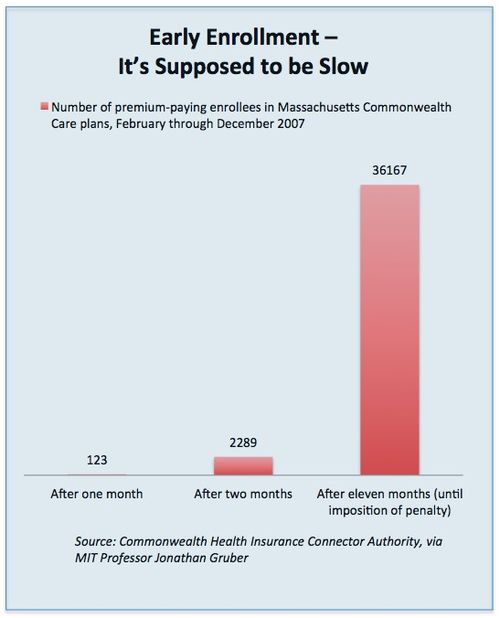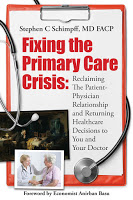
Much has been said and written about the dearth of new commercial health insurance plan enrollees on the federal and state exchanges and, by contrast, the excessive numbers of Medicaid expansion enrollees, the death spiral signified by the absence of Young Invincibles from the exchanges, etc.

Much has been said and written about the dearth of new commercial health insurance plan enrollees on the federal and state exchanges and, by contrast, the excessive numbers of Medicaid expansion enrollees, the death spiral signified by the absence of Young Invincibles from the exchanges, etc.
The HealthBlawger suggests: Cool your jets.
As the chart reproduced above amply demonstrates based on the Massachusetts experience (credit: Jonathan Cohn aka @CitizenCohn at The New Republic), and as a moment spent considering human nature will confirm, it is unlikely that most folks who need to pay American cash money out of pocket to be counted among the newly insured thanks to the health insurance exchanges — be they state or federal — will do so until they have to (i.e., not until, say, mid-December). The notion that everyone who needed insurance would purchase coverage in the first week of October was always sheer fantasy. Yes, healthcare.gov is broken. Yes, the federal procurement process for software and web development is broken. But neither of those facts requires the conclusion that “Obamacare” is a massive failure.
Yes, the folks most likely to enroll in December are NOT the Young Invincibles. However, thinking insurance companies eager to grow their customer base by tens of millions of subscribers have budgeted for the losses related to the rush of long-uninsured and underinsured enrollees signing up for Year 1, and the Young Invincibles will follow as the penalties for noncoverage increase over time. No death spiral is upon us.
(Would a single payor system have made more sense? Sure. But in a country where “Gummint outta my Medicare!” is seen as a reasonable political statement by many, we got about as good as we could get.)
Most of the high numbers of Medicaid enrollees have been onboarded automatically by states that had Medicaid expansion programs of their own in the past, and that are transitioning members to the new programs that are further subsidized by the federal government under the ACA. No mystery there.
Here’s hoping for some less hysterical coverage of health reform implementation. (As my old auto mechanic used to say: “Hope burns eternal.”)







